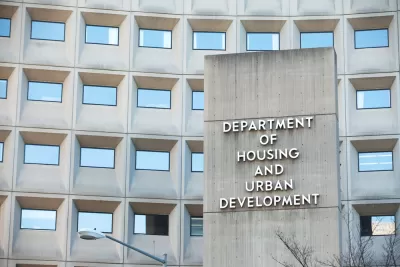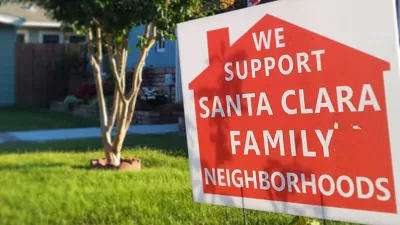Earlier this year, the U.S. Department of Housing and Urban Development devoted an entire issue of a quarterly newsletter to land use regulations and the idea that local laws are strangling the nation's supply of affordable housing.

An article from the Evidence Matters, a quarterly newsletter published by the U.S. Department of Housing and Urban Development's (HUD) Office of Policy Development and Research (PD&R), went unnoticed by wider audiences until a tweet this week by HUD Secretary Ben Carson. The Spring 2018 edition of the newsletter focuses on local zoning and land use regulations, making the case that land use regulations and 'not in my backyard' opposition raise the cost of development and contribute to the nation's affordable housing crisis. Secretary Carson used the tweet to protest a New York Times article that isn't specifically cited, but we can set that particular debate aside for now.
The #affordablehousingcrisis needs to be addressed at EVERY level of gov. Sadly, the @nytimes missed an important opportunity to show what’s really driving rents in high-cost areas. Learn more about reg barriers to #affordablehousing here https://t.co/Xhx8y6ZQII
— Ben Carson (@SecretaryCarson) July 30, 2018
The "Regulatory Barriers and Affordable Housing: Problems and Solutions" article Carson references from Evidence Matters lends an unequivocal endorsement to the idea that local land use regulations are responsible for the lack of affordable housing around the country, also proposing steps to limit the reach of local land use regulation. According to the article, Secretary Carson recently spoke to the policy advisory board of the Joint Center for Housing Studies of Harvard University, saying that "HUD should 'identify and incentivize the tearing down of local regulations that serve as impediments to developing affordable housing stock,' including '[o]ut-of-date building codes, time-consuming approval processes, restrictive or exclusionary zoning ordinances, unnecessary fees or taxes, and excessive land development standards [that] can all contribute to higher housing costs…'"
To present evidence of the costs of regulatory barriers, the article refers to another article in the same newsletter titled "Exploring the Current State of Knowledge on the Impact of Regulations on Housing Supply." Both articles note a lack of definitive proof in connecting local land use regulation to the high cost of housing in high demand markets, but it's abundantly clear that the position of HUD is that local regulations have contributed significantly to the nation's housing crisis. Thus has Secretary Ben Carson's HUD, otherwise known as the Trump administration's HUD, adopted a position of a libertarian valance that has become popular "Yes In My Backyard" movement.
It's hard to imagine the platform of President Donald Trump every intersecting with leaders of the YIMBY movement (I'm thinking of some of the YIMBY rabble rousers in the San Francisco Bay Area, especially), but here we are.
The anti-land-use-regulation agenda put forward by the newsletter is also notable for its choice of a controversial prescription for the undesirable consequences of overbearing local land use control: state intervention. The article suggests three ways for states to intervene in local zoning issues, sourced from research published in the Housing Policy Debate journal, along with five additional methods proposed in a report published by the Urban Land Institute [pdf]. An article titled "States Reduce Regulatory Barriers for Affordable Housing" is also found in the Spring 2018 edition of Evidence Matters, with case studies from Massachusetts and California. Make no mistake: this Evidence Matters newsletter is a multi-pronged attack on local land use regulation, and in the process we encounter Secretary Ben Carson touting the success of California State Senator Scott Wiener.
Added to the irony oozing from every citation of CJ Grabbe [pdf] and Edward Glaeser is an unmistakable whiff of the Obama legacy. Astute observers will recall the Obama administration taking a similarly pro-development, anti-local-control position with a policy paper published in September 2016. To find such synchronicity in housing policy now is a shocking surprise to say the least, given the Trump administration's penchant for dismantling every possible sign of the Obama legacy, including in housing policy. Maybe someone should notify Secretary Carson?
It's unclear what the lesson for any one deeply invested in the debate over land use regulation might be other than to be cautious when choosing a single path along the way to local control, state control, state's rights, or federal powers. Intersections are just ahead, and it's best to prepare for the kinds of allies you'll find waiting there.

Maui's Vacation Rental Debate Turns Ugly
Verbal attacks, misinformation campaigns and fistfights plague a high-stakes debate to convert thousands of vacation rentals into long-term housing.

Planetizen Federal Action Tracker
A weekly monitor of how Trump’s orders and actions are impacting planners and planning in America.

San Francisco Suspends Traffic Calming Amidst Record Deaths
Citing “a challenging fiscal landscape,” the city will cease the program on the heels of 42 traffic deaths, including 24 pedestrians.

Adaptive Reuse Will Create Housing in a Suburban Texas Strip Mall
A developer is reimagining a strip mall property as a mixed-use complex with housing and retail.

Study: Anti-Homelessness Laws Don’t Work
Research shows that punitive measures that criminalized unhoused people don’t help reduce homelessness.

In U.S., Urban Gondolas Face Uphill Battle
Cities in Latin America and Europe have embraced aerial transitways — AKA gondolas — as sustainable, convenient urban transport, especially in tricky geographies. American cities have yet to catch up.
Urban Design for Planners 1: Software Tools
This six-course series explores essential urban design concepts using open source software and equips planners with the tools they need to participate fully in the urban design process.
Planning for Universal Design
Learn the tools for implementing Universal Design in planning regulations.
Heyer Gruel & Associates PA
JM Goldson LLC
Custer County Colorado
City of Camden Redevelopment Agency
City of Astoria
Transportation Research & Education Center (TREC) at Portland State University
Jefferson Parish Government
Camden Redevelopment Agency
City of Claremont






























